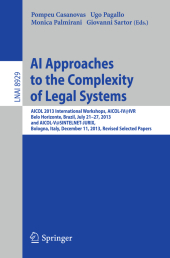 Neuerscheinungen 2014Stand: 2020-02-01 |
Schnellsuche
ISBN/Stichwort/Autor
|
Herderstraße 10
10625 Berlin
Tel.: 030 315 714 16
Fax 030 315 714 14
info@buchspektrum.de |

Pompeu Casanovas, Ugo Pagallo, Monica Palmirani, Giovanni Sartor
(Beteiligte)
AI Approaches to the Complexity of Legal Systems
AICOL 2013 International Workshops, AICOL-IV@IVR, Belo Horizonte, Brazil, July 21-27, 2013 and AICOL-V@SINTELNET-JURIX, Bologna, Italy, December 11, 2013, Revised Selected Papers
Herausgegeben von Casanovas, Pompeu; Pagallo, Ugo; Palmirani, Monica; Sartor, Giovanni
2014. 2014. xii, 291 S. 72 SW-Abb. 235 mm
Verlag/Jahr: SPRINGER, BERLIN; SPRINGER BERLIN HEIDELBERG 2014
ISBN: 3-662-45959-0 (3662459590)
Neue ISBN: 978-3-662-45959-1 (9783662459591)
Preis und Lieferzeit: Bitte klicken
This book constitutes revised selected papers from the two International Workshops on Artificial Intelligence Approaches to the Complexity of Legal Systems, AICOL IV and AICOL V, held in 2013. The first took place as part of the 26th IVR Congress in Belo Horizonte, Brazil, during July 21-27, 2013; the second was held in Bologna as a joint special workshop of JURIX 2013 on December 11, 2013. The 19 papers presented in this volume were carefully reviewed and selected for inclusion in this book. They are organized in topical sections named: social intelligence and legal conceptual models; legal theory, normative systems and software agents; semantic Web technologies, legal ontologies and argumentation; and crowdsourcing and online dispute resolution (ODR).
Introduction.- Law, Social Intelligence, nMAS and the Semantic Web: An Overview.- I Social Intelligence and Legal Conceptual Models The Legal Roots of Social Intelligence and the Challenges of the Information Revolution.- Methods for Law and ICT: An Approach for the Development of Smart Cities.- Opening Public Deliberations: Transparency, Privacy, Anonymisation.- Online Dispute Resolution and Models of Relational Law and Justice: A Table of Ethical Principles.- Drafting a Composite Indicator of Validity for Regulatory Models and Legal Systems.- Legal Theory, Normative Systems and Software Agents Measuring the Complexity of the Legal Order over Time.- Time, Trust and Normative Change. On Certain Sources of Complexity in Judicial Decision-Making.- The Construction of Models and Roles in Normative Systems.- Integrating Legal-URN and Eunomos: Towards a Comprehensive Compliance Management Solution.- Criminal Liability of Autonomous Agents: From the Unthinkable to the Plausible.- Semantic Web Technologies, Legal Ontologies and Argumentation Extraction of Legal Definitions and Their Explanations with Accessible Citations.- Representing Judicial Argumentation in the Semantic Web.- On the Road to Regulatory Ontologies: Interpreting Regulations with SBVR.- Conceptual Modeling of Judicial Procedures in the e-Codex Project. -Organized Crime Structure Modelling for European Law Enforcement Agencies Interoperability through Ontologies.- Crowdsourcing and Online Dispute Resolution (ODR) Harnessing Content and Context for Enhanced Decision Making.- Consumedia. Functionalities, Emotion Detection and Automation of Services in a ODR Platform.- Crowdsourcing Tools for Disaster Management: A Review of Platforms and Methods.- A Method for Defining Human-Machine Micro-task Workflows for Gathering Legal Information.
Giovanni Sartor is Marie-Curie Professor of Legal Informatics and Legal Theory at the European University Institute of Florence and Professor of Computer and Law at the University of Bologna (Italy), after obtaining a PhD at the European University Institute (Florence), working at the Court of Justice of the European Union (Luxembourg), being a researcher at the Italian National Council of Research (ITTIG, Florence), and holding the chair in Jurisprudence at Queen s University of Belfast (where he now is honorary professor). He is author of ten books and has published widely in legal philosophy and legal theory, legal informatics (artificial intelligence and law), computational logic, legislation technique, and computer law.


